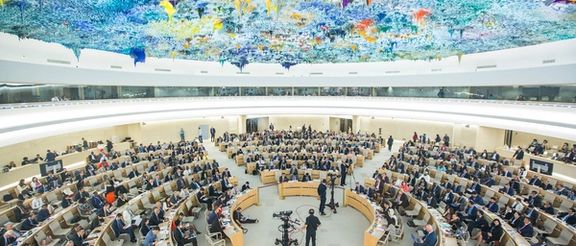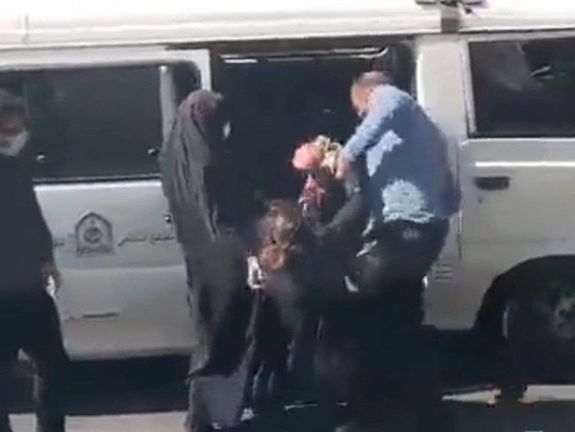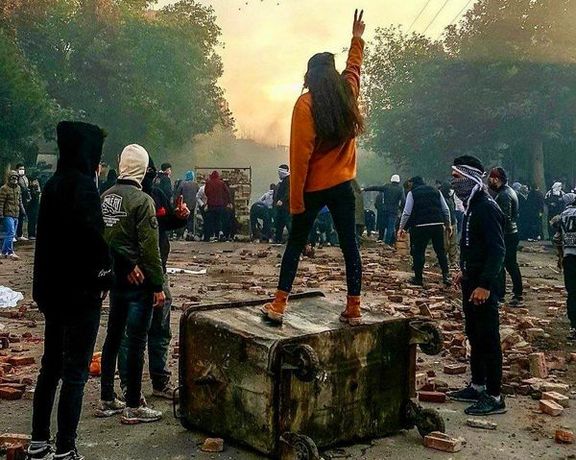Iran On Verge Of ‘Renaissance’ And Its Women Need Support

November was a good month for democracy-seeking Iranians who have been on the streets since September, chanting "Woman, Life, Liberty," and "Death to Dictator."
The US government imposed new sanctions on Iranian officials over the protests crackdown sparked by the death of Mahsa Amini, a 22-year-old Kurdish woman in detention after she was fatally beaten in the head for alleged violations of the country’s strict dress code.
The United Nations Human Rights Council held a special session on Iran on 24 November and passed a resolution condemning the deteriorating human rights situation in the Islamic Republic of Iran, the violent crackdown on peaceful protesters, the death of hundreds of people, including scores of children, and the arrests of thousands in connection with the nationwide protests, and voted to establish a Fact-finding Mission to Investigate Alleged Human Rights Violations in Iran Related to the Protests.
On December 14th, there will be an opportunity for the United Nations to undo one of the most grotesque decisions in the history of this world body: appointing the gender-Apartheid Islamic Regime of Iran to the Commission on the Status of Women (CSW).
Since 1946, CSW has been empowering women and promoting gender equality, contrasting with rules, laws, and regulations in Iran's Islamic Regime. The request to hold a vote in the UN's Economic and Social Council came from a resolution led by the US, at the request of Iranian women activists inside and abroad, to oust Iran due to the government crackdown on the women-led protests. But what we’ve seen in the last few weeks is the Islamic Regime of Iran’s (IRI) successful activation of its supporters and apologists in western media, think tanks, and universities to be their propaganda machine against revolution. The IRI and its proxies are engaged in a concerted effort to perpetuate a false narrative about the uprising of Iranian people against their government’s ideology and soften the brutal face of Iran’s regime.

We Iranians living abroad see the competing versions of reality out of Iran, and who gets to choose which reality becomes the narrative, and it’s obvious the some proxies of the regime who have the money and influence are often the ones who decide. For decades, what these so-called experts or pundits said was gaslighting and made us question our account of reality in our experiences by making us question what we know to be the truth.
After years of activists exposing IRI's proxies on social media accounts and revealing the IRI's lobbies, Hossein Ronaghi, a prominent Iranian human rights activist, blogger, and political prisoner, wrote in an Op-ed for the Wall Street Journal, expressing his frustration. "For us, it is as if there are two Irans—the one where we live and another that you read about. Your Iran is defined by a pesky nuclear negotiation. Ours is much worse. It is a religious police state where we live in fear, with countless red lines that most dare not cross. It is a country of repression, censorship, and violence."
A recent New York Times piece shows the propaganda machine in action in regard to Iran’s ‘morality police’ and its future in the country. In response to a reporter's question, IRI's Attorney General said: "The Morality Police has nothing to do with the judiciary, and it was abolished by the same authorities who installed it.” These words prompted reporter Farnaz Fassihi to write an article entitled “Iran Has Abolished Morality Police.” The only problem? It’s not true. On the morning of December 4th, Al-Alam—a channel affiliated with the IRI Broadcasting—denied the possibility of the morality police being shut down and wrote: "Some foreign media have tried to interpret the words of the Attorney General as a retreat by the IRI on the issue of hijab and chastity and affected by the recent riots,” when, according to the IRI, that was not the intended meaning.
For years, Iranians have complained on social media about Fassihi’s reporting and have asked the Times to fix this problem. Iranians even wrote letters to the paper about her “professional infractions”, which include normalizing the Islamic Republic’s brutality through the obfuscation of truth in her journalism over several years.” But our concerns continue to be ignored.

Regardless of whether or not the morality police were actually disbanded, "compulsory hijab" is codified by law in Article 638 of the Islamic Penal Code. It states: "Women who appear without an Islamic hijab in the streets and public will be sentenced to imprisonment from ten days to two months, or a fine of fifty thousand to five hundred thousand Rials." And according to Article eight of the IRI’s Constitution, if someone is not following the Islamic Rules, any citizen can demand that person follow the laws. That’s why we see plain clothes officers or even regular citizens verbally abuse women or even threaten them by calling the police if they don’t wear their compulsory Hijab.
The cruel reality for Iranian women goes far beyond the rules around Hijab. By law, women can’t divorce their husbands, have no child custody rights, receive half inheritance, and can’t leave the country without their husbands' permission. Women also cannot become judges, study certain subjects, play certain sports, enter stadiums, mingle with men, or get elected or appointed into several key positions, including Supreme Leader, President of the Country, President of the Judiciary System, Member of the Guardian Council or Expediency Council, and others. Girls as young as nine can be forced to marry men their father’s pick. Men can legally marry four women and have as many concubines as they wish. Men also can beat their wives. So how can a regime that subjugates women, with so many discriminatory laws, be a member of the Commission on the Status of Women?
Iran is going through a real ‘Renaissance,’ a revolution demanding freedom, democracy, secularism, equality, and justice. Iranians are tired of the restrictions of the gender-apartheid Islamic regime on what they can eat or drink or wear, who they can talk to, and whom they can love. They are tired of the mismanagement of their country's natural resources and nature by clerics and their offspring. A free-democratic Iran means peace and prosperity for the Middle East. Without the Islamic regime, a state sponsor of terrorism, its neighboring countries will be more peaceful, and Iranians will have the freedom and justice they desperately seek. And we need western voices to help get us there.
The opinions expressed by the author are not necessarily the views of Iran International